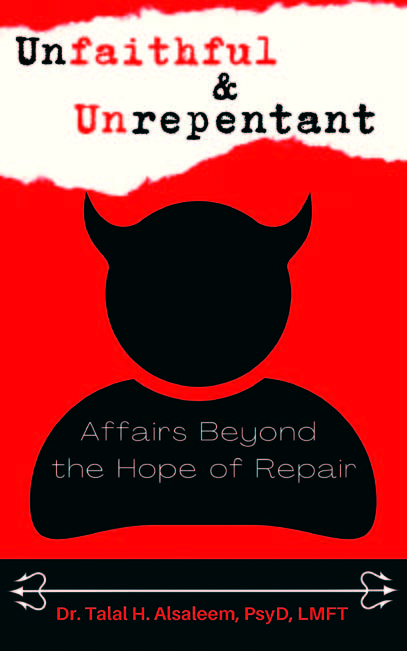Many struggle to accept that infidelity is a conscious choice the unfaithful makes to meet a need.
Some of those needs are healthy and can be fulfilled successfully through proper outlets that honor the expected parameters of exclusivity. Other needs are not healthy or realistic for someone in a committed relationship. Why people struggle with accepting this fact is twofold: one, the impulsive nature of how the majority of affairs start can wrongly imply the absence of thinking; two, the discomfort in accepting that one can consciously commit such awful and destructive acts to themselves and their loved ones. Infidelity doesn’t happen overnight. It’s a behavior that represents an untreated problem that started a long time ago.
If we accept that infidelity is a choice people make as a result of a preexisting problem, we can begin to understand the factors that compel people to engage in it. Based on my extensive research and direct clinical work, there are different factors that can cause someone to cheat. The most common are relationship factors. In these scenarios, infidelity is caused by a relationship deficit that has left one or both partners dissatisfied. The second most common are individual factors. These are the scenarios in which the affair was caused by a mental health issue that the unfaithful partner struggles with. There are many mental health issues that can lead to infidelity, but the most common ones are personality disorders and addiction. The third type is environmental factors. Here, the causes of infidelity are related to unique circumstances in the unfaithful’s immediate environment that make it easy to cross the lines of fidelity. Common environmental factors are cultural norms that shape our worldviews in our families of origin and social environments and how those norms sanction or glorify infidelity behavior.
It’s noteworthy to mention the three types of factors are interconnected and can amplify their impact on one another. This is why infidelity recovery is challenging and needs the skillset of a qualified clinician to help the couple discover all the causes that led to the affair to prevent relapse.
There are many relationship factors that lead to infidelity, all of which prevent the couple from meeting each other’s needs. The three most common relationship factors I encounter are incompatibility, poor communication and conflict resolution, and failure to adapt to changes.
As for incompatibility, it’s difficult for people to meet their partner’s needs if those needs happen to be incompatible with who they are. This is especially true if the differences between partners in certain domains are polar opposite. Let’s look at politics for example. If you have one partner on the far right and another on the far left, they are going to struggle in finding a middle ground. Their life is going to be filled with conflict, judgment, and a lack of respect. This is especially true if their political ideologies and the values associated with them spill over into life decisions and parenting styles. I have worked with many couples in which the catalyst for the affair was the connection with like-minded individuals with a compatible worldview.
If a couple lacks good communication and conflict resolution skills, they will not be able to express their needs clearly which can lead to dissatisfaction in the relationship. Think of it this way — in order for someone to have their needs met, they first must know what those needs are. They then must express these needs to their partner in a clear and direct manner to highlight their necessity and how they are expecting their partners to meet those needs. More importantly, couples must learn how to address conflicts successfully, especially if the conflict is getting in the way of meeting each other’s needs. The couples who do not acquire this skill tend to be very unfulfilled with their partners. This can manifest through conflict avoidance, explosive and repetitive arguments, or a combination of the two. Poor communication and conflict resolution skills lead to a buildup of resentment. Often, people start affairs because they get tired of their partner not meeting their needs.
Many couples fail in adapting to change. Everyone encounters stressors throughout their lives, some positive, some negative. Some stressors we choose, and others are thrust upon us. The common mistakes couples make when they have new stressors, are expecting their needs to be fulfilled in the same way as they were prior to the new stressor, or they become preoccupied with the new stressor and stop fulfilling each other’s needs. A classic example are the couples who expect their sexual intimacy to be the same after having a new baby or the ones who put their sexual needs on the back burner and become fully occupied by their parenting responsibilities. When couples encounter a new stressor, they need to pause and reassess how they are going meet each other’s needs in a way that accommodates the impact of the new stressor in their life.
The best advice I can give to anyone who has experienced infidelity is to use this traumatic event as a catalyst for change. The discovery of an affair is a clear sign of an unresolved, underlying problem that needs serious attention and concrete action. Healing from infidelity doesn’t always mean repairing the relationship, however. Sometimes healing from infidelity takes the form of ending a bad relationship that should not have started in the first place.
 Dr. Talal H. Alsaleem is hailed as the father of modern infidelity counseling. Building upon his expertise as the author of the acclaimed book, Infidelity: The Best Worst Thing that Could Happen to Your Marriage, he is a trusted authority in the field. As the founder of The Infidelity Counseling Center, Dr. Alsaleem has dedicated his research and clinical work to uncovering the root causes of infidelity and developing effective treatment methods for recovery. His revolutionary approach, Systematic Affair Recovery Therapy (SART)™, has transformed the lives of countless couples, helping them navigate the intricate challenges of healing from affairs.
Dr. Talal H. Alsaleem is hailed as the father of modern infidelity counseling. Building upon his expertise as the author of the acclaimed book, Infidelity: The Best Worst Thing that Could Happen to Your Marriage, he is a trusted authority in the field. As the founder of The Infidelity Counseling Center, Dr. Alsaleem has dedicated his research and clinical work to uncovering the root causes of infidelity and developing effective treatment methods for recovery. His revolutionary approach, Systematic Affair Recovery Therapy (SART)™, has transformed the lives of countless couples, helping them navigate the intricate challenges of healing from affairs.

















